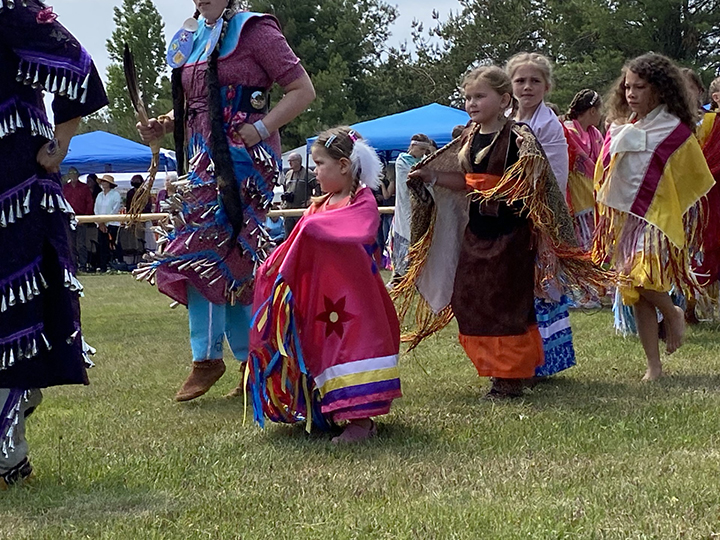Tribes celebrate as SCOTUS upholds law that gives Native Americans preference in foster care placement

Courtesy Photo A recent powwow is seen in this photo provided by the Sault Tribe of Chippewa Indians.
ALPENA — In a seven-to-two decision on Thursday, the U.S. Supreme Court upheld the Indian Child Welfare Act, which requires states to try to place Native American children with Native American families when they’re in foster care.
The act was originally brought into court in February 2022 to be reviewed. Plaintiffs argued the act was unconstitutional because it discriminated based on race. However, the U.S. Supreme Court decided that Native Americans are a political group, not a racial group.
The chairman of the Sault Tribe of Chippewa Indians, Austin Lowes, said he completely agrees with the court because, to be a member of a tribe, people must obtain citizenship, whereas being a member of racial group is simply based on race.
Asked his initial thoughts on the act being upheld, Lowes said he was absolutely thrilled.
“We don’t get a lot of victories in Indian country, and this is definitely one of them,” he said.
According to the Native American Rights Fund, the Indian Child Welfare Act was enacted 43 years ago to protect the wellbeing and best interests of Indian families and children.
Lowes said it was a message of disrespect to have the act brought into question. Doing so goes against tribes’ sovereignty and displays a misunderstanding of why the protection was enacted to begin with.
“These protections are in place to address the larger issues of genocide that Native Americans have experienced in this country,” he said. “You know, there isn’t anything more traumatic that can happen to children than being removed from your parents.”
The Indian Child Welfare Act was created in response to boarding schools removing Native American children from their families and the trauma it brought tribal communities. Lowes said that, unless laws like the Indian Child Welfare Act are in place, “who’s to say those things won’t happen again?
“They (children) had their hair cut, they had their clothing removed, they had their language stripped from them,” he said. “And, you know, at the end of the day, they couldn’t have their humanity stripped from them.
“We’re the descendants of all those survivors,” he added. “And, looking forward, I would expect there to be protections for our Native American kids and our families.”
Prior to becoming tribal chairman, Lowes was a child welfare caseworker. He said his experience working in the occupation gave him a broader perspective of the protections the act provides.
“I know firsthand what ICWA does,” Lowes said. “It saves Native American children’s lives, and it preserves our families, and that’s a good thing.”
With the recent victory, he said he hopes to see no further challenges against the act. Additionally, he explained people need to understand why the act exists.
“It’s to counteract genocide that took place to our Native American children,” Lowes said. “I mean, there’s Native American children buried in the back yards of old boarding schools throughout this country.”
Looking to the future, Lowes said the tribal community will always need to stand on guard against a challenge being raised against them.
“We always have to be prepared to fight for our families and our children,” he said.
The “issues are complicated” Justice Amy Coney Barrett wrote for the majority that included the court’s three liberals and four of its six conservatives, but the “bottom line is that we reject all of petitioners’ challenges to the statute.”
Justices Clarence Thomas and Samuel Alito dissented, each writing that Congress lacks the authority to interfere with foster care placements and adoptions, typically the province of the states. The decision, Alito wrote, “disserves the rights and interests of these children.”
Several conservative justices expressed concern about at least one aspect of the law that gives preference to Native parents, even if they are of a different tribe than the child they are seeking to adopt or foster.
Among them was Justice Brett Kavanaugh, who was in the majority Thursday in favor of the tribes. But Kavanaugh injected a cautionary note in a separate opinion focused on the preferences for Native foster and adoptive parents.
“In my view, the equal protection issue is serious,” Kavanaugh wrote, commenting that the race of prospective parents and children could be used to reject a foster placement or adoption, “even if the placement is otherwise determined to be in the child’s best interests.”
The Supreme Court dealt with that issue by determining that neither Texas nor the parents had legal standing to make that argument in this case.
The Associated Press contributed to this report.




